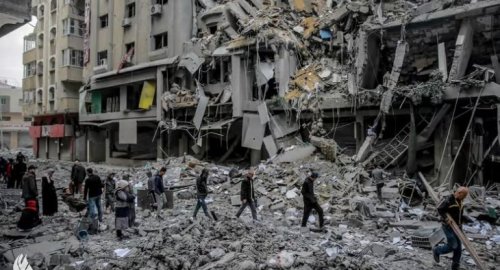
U.S. aid official says famine has begun in northern Gaza

- 12-04-2024, 09:08
INA- sources
Samantha Power, the director of the U.S. Agency for International Development (USAID), told lawmakers Wednesday that people in parts of northern Gaza have begun facing famine.
Why it matters: Power is the first U.S. official to publicly say that famine has started in parts of the enclave, which had been on the verge of famine for months because of humanitarian aid disruptions from the Israel-Hamas.
Famine conditions are present despite the U.S. and other western nations conducting airdrops of humanitarian aid for civilians in Gaza.
In addition to food, people in Gaza also lack access to clean water, medicine, medical care and other essentials due to damage from Israeli airstrikes and Israel's blockade of the enclave.
Context: Power's assessment came during an exchange with Rep. Joaquin Castro (D-Texas) while at a House Foreign Affairs Committee hearing Wednesday.
Castro asked Power of a recent cable sent by USAID to the White House's National Security Council, State Department offices and diplomatic posts abroad, which HuffPost first reported.
The cable had warned that famine is likely occurring in parts of the Gaza Strip and the pace of hunger-related deaths will "accelerate in the weeks ahead."
What they're saying: Power said the warning in that cable was based on a recent evaluation from the UN-backed Integrated Food Security Phase Classification (IPC), which said people in northern Gaza could begin facing famine as early as March.
"That is their assessment, and we find that assessment is credible," she sai
When Castro asked her to clarify if that meant famine is already occurring there, Power responded, "Yes."
"Food has not flowed in sufficient quantities to avoid this imminent famine in the south, and these conditions that are giving rise already to child deaths in the north," she said.
Zoom out: Power said the rate of malnutrition among children in northern Gaza prior to Oct. 7 was "almost zero" but it now stands at one in three. Though she clarified that USAID currently could not estimate how many children are at risk of dying from malnutrition.
"But in terms of actual severe, acute malnutrition for [those under 5 years old], that rate was 16% in January and became 30% in February," she said, "We're awaiting the March numbers, but we expect it to get markedly worse."
White House press secretary Karine Jean-Pierre said during a briefing on Thursday didn't directly comment on Power's assessment but noted that IPC's report from last month said famine was imminent.
"We know how dire the situation is in Gaza, so we are certainly deeply concerned about these reports," Jean-Pierre said, adding that the administration "will continue to push Israel to increase the flow."
The IPC did not respond to a request to comment.
The big picture: Israel in March was ordered by the International Court of Justice to allow unimpeded access for humanitarian aid into the Gaza Strip to prevent famine from setting in.
The ruling was part of a case brought by South Africa, which accused Israel of state-sanctioned genocide in Gaza.
The court ordered Israel to take urgent action to prevent genocide in Gaza by allowing more humanitarian aid but it did not order Israel to end its military offensive in the enclave.
Israel agreed last week to increase the flow of humanitarian aid to Gaza while under pressure from the U.S. and several other countries following the killing of seven aid workers in an Israeli air strike.
SOURCE: axios
US Central Command: We killed ISIS terrorist leader Abu Yusuf in Syria
- International
- 24/12/20
Liverpool compete with Real Madrid to sign Olympique Lyonnais star
- Security
- 24/12/19
ISC, ADX discuss Strengthening Economic Ties
- Economy
- 24/12/16
Iraq assumes presidency of Arab Investment Company’s Executive Board
- Economy
- 24/12/17












